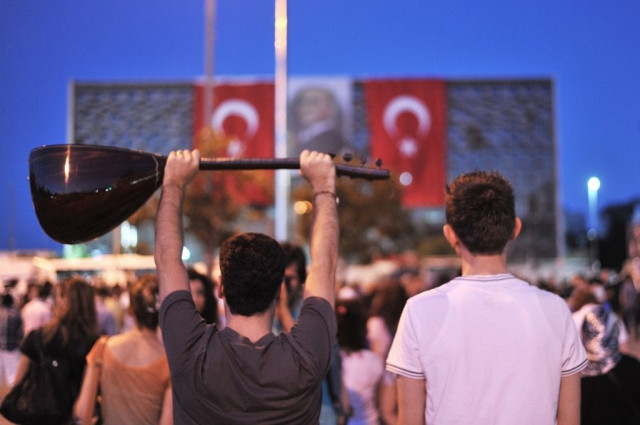Germany proposes delaying EU-Turkey talks over protests
Germany proposed on Monday postponing a new round of EU membership talks with Turkey.

Germany proposed on Monday postponing a new round of EU membership talks with Turkey.PHOTO: AFP
The European Union had planned to revive Turkey's EU ambitions on Wednesday by opening a new chapter, or policy area, in the talks - the first opened since 2010.
But Germany, backed by several other EU states, is blocking the plan over Turkey's handling of protests that swept its cities after police used teargas and water cannon to disperse a demonstration against redevelopment of an Istanbul square.
Two weeks of clashes with police have left four people dead, including a policeman, and some 7,500 injured.
A delay in opening the new chapter would raise new doubts about whether Turkey, a largely Muslim country of 76 million people, will ever be admitted to the European club.
A senior Turkish official was cited last week that a decision by the EU not to open the new chapter would "draw a strong reaction from Turkey".
German Foreign Minister Guido Westerwelle said Berlin had given the compromise proposal to Ireland, holder of the EU presidency, which was consulting other member states.
"We cannot say today if this proposal will fly. We are doing our best to come to a good solution," he told reporters at an EU foreign ministers' meeting in Luxembourg.
A German diplomat said the proposal was for the EU to agree now to open the new chapter but to delay holding a meeting with Turkey to launch it until later this year.
The official launch would be after the EU issues its annual report on Turkey's progress in bringing its laws into line with EU practice and on human rights, due on October 9.
The delay would be helpful to German Chancellor Angela Merkel because it would push back the talks until after the September German elections. Merkel's conservatives oppose Turkish EU membership.
Opposition
But some other EU governments objected to the German proposal. "Some member states assume the Turks wouldn't like the idea," one EU diplomat said.
Since a unanimous agreement is needed, it looked increasingly likely that the EU will have to call off Wednesday's talks.
"We'll have to make some kind of decision tomorrow (Tuesday) either way," another EU source said.
The issue may be discussed by EU ministers who meet in Luxembourg on Tuesday to decide whether to set a date for starting membership talks with Serbia.
Ireland's Foreign Minister Eamon Gilmore said there was no agreement as yet to open the new chapter. "We're taking soundings on that (German proposal) from interested parties and will reach conclusions some time before Wednesday," he said.
Turkey and Germany became embroiled in a diplomatic row last week after Merkel said she was appalled by Turkey's crackdown.
In comments on Turkey's possible membership on Monday, Merkel did not address the compromise proposal but said Turkey must make progress on its relations with EU member Cyprus to give impetus to its membership ambitions.
Speaking of Turkey's forceful reaction to the protests, Merkel told the Turkish-German Chamber of Commerce in Berlin: "We cannot ignore what is happening."
Turkish Deputy Prime Minister Bulent Arinc told reporters on Monday that some EU countries treated Turkey's EU bid negatively because of their own domestic politics but that he expected a "positive" decision to be made on opening a new chapter.
"No country should politicize this process in any way and no political obstacles should be placed in front of us. I, today, think a positive decision will come out of this and the difficulties experienced in recent days in Turkey-European Union relations will be swiftly overcome," Arinc said in Ankara.
Austrian Foreign Minister Michael Spindelegger threw strong support behind Germany's stance.
"We are waiting for signals from Ankara that they are really going to give people in Turkey their rights. They have to think about the behavior of their police ... There has to be some movement from Turkey before we start negotiations on a new chapter," he said in Luxembourg.
Some EU policymakers think that, far from than distancing itself from Turkey over the protests, the EU should engage more closely to support civil rights.
"We want to influence events in Turkey, we don't want to walk away from Turkey," Swedish Foreign Minister Carl Bildt said.
Turkey opened negotiations to join the EU in 2005, 18 years after applying. The talks have advanced at a snail's pace. It has provisionally closed just one of 35 chapters.



















COMMENTS
Comments are moderated and generally will be posted if they are on-topic and not abusive.
For more information, please see our Comments FAQ